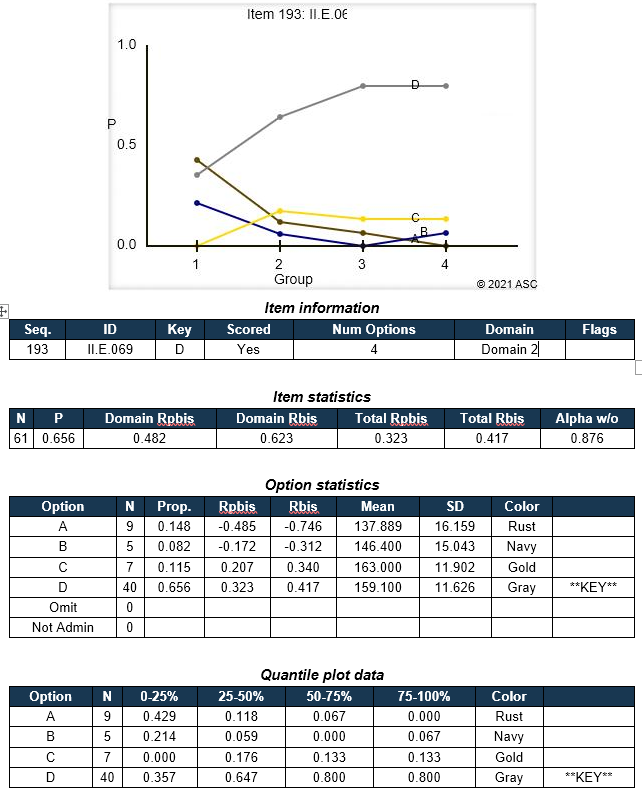Nathan Thompson articles

Item Writing: Tips for Authoring Test Questions
Item writing (aka item authoring) is a science as well as an art, and if you have done it, you know just how challenging it can be! You are experts at what you do, and

Validity Threats and Psychometric Forensics
Validity threats are issues with a test or assessment that hinder the interpretations and use of scores, such as cheating, inappropriate use of scores, unfair preparation, or non-standardized delivery. It is important to establish a

Item Review Workflow for Exam Development
Item review is the process of ensuring that newly-written test questions go through a rigorous peer review, to ensure that they are high quality and meet industry standards. What is an item review workflow? Developing

Likert Scale Items
Likert scales (items) are a type of item used in human psychoeducational assessment, primarily to assess noncognitive constructs. That is, while item types like multiple choice or short answer are used to measure knowledge or

What are Stackable Credentials?
Stackable credentials refer to the practice of accumulating a series of credentials such as certifications or microcredentials over time. In today’s rapidly evolving job market, staying ahead of the curve is crucial for career success. Employers

What are Test Blueprints & Specifications for Assessment?
Test blueprints, aka test specifications (shortened to “test specs”), are the formalized design of an assessment, test, or exam. This can be in the context of educational assessment, pre-employment, certification, licensure, or any other type.

What is a testlet?
Testlet is a term in educational assessment that refers to a set of test items or questions grouped together on a test, often with a common theme or scenario. This approach aims to provide a

Job Task Analysis Study: Why essential for Certification?
Job Task Analysis (JTA) is a formal process to define what is being done in a profession, especially what is most important or frequent, and then using this information to make data-driven decisions. It is

Question and Test Interoperability (QTI)
Question and Test Interoperability® (QTI®) is a set of standards around the format of import/export files for test questions in educational assessment and HR/credentialing exams. This facilitates the movement of questions from one software platform

Assessment Systems presents at the Conference on Test Security (COTS)
The Conference on Test Security is a scholarly conference devoted to the topic of security in educational, credentialing, and employment assessment. Test fraud/cheating is one of the most salient threats to score validity, and can

Four-Fifths Rule: Fair Employment Selection
The Four-Fifths Rule is a term that refers to a guideline for fairness in hiring practices in the USA. Because tests are often used in making hiring decisions, the Four-Fifths Rule applies to them so

Classical Test Theory: Item Statistics
Classical Test Theory (CTT) is a psychometric approach to analyzing, improving, scoring, and validating assessments. It is based on relatively simple concepts, such as averages, proportions, and correlations. One of the most frequently used aspects

Content Validity in Assessment
Content validity is an aspect of validity, a term that psychometricians use to refer to evidence that interpretations of test scores are supported. For example, predictive validity provides evidence that a pre-employment test will predict

Predictive Validity of Test Scores: Why so Critical for Pre-Employment and Higher Education?
Predictive Validity is a type of test score validity which evaluates how well a test predicts a future variable, and serves as evidence that the test is therefore useful for this purpose. For instance, it

Classical Test Theory vs. Item Response Theory
Classical Test Theory and Item Response Theory (CTT & IRT) are the two primary psychometric paradigms. That is, they are mathematical approaches to how tests are analyzed and scored. They differ quite substantially in substance

All Psychometric Models Are Wrong
The British statistician George Box is credited with the quote, “All models are wrong but some are useful.” As psychometricians, it is important that we never forget this perspective. We cannot be so haughty as

Best Online Proctoring Providers: The Alternative List You Need
There are many online proctoring providers on the market today, so how can you strategically shop for one? This post provides some considerations, and a list of most vendors, to help you with the process.

ANSI ISO/IEC 17024 Accreditation for Certifications
ANSI ISO/IEC 17024 accreditation is an internationally recognized standard for the accreditation of personnel certification bodies. That is, it is a stamp of approval from an independent audit which says your certification is good quality.
